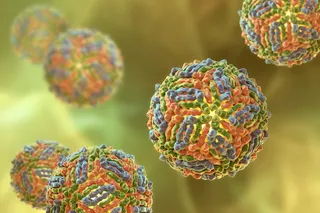People fighting off winter colds and bouts of the flu typically reach for a glass vitamin C-packed orange juice, but new research suggests that vitamin D may be a better protector. People with low levels of the vitamin, which is often called the sunshine vitamin because sun exposure triggers its production in the body, are more likely to catch colds, the flu, and even pneumonia, a broad new study reports. The effect was magnified in people with asthma or other lung diseases. Vitamin D deficiency
is quite common in the United States -- particularly in winter.... "People think that if they have a good, balanced diet that they will get enough vitamin D, and that's actually not true," said Dr. Michal Melamed.... "Unless you eat a lot of fish and drink a lot of milk, you can't get enough vitamin D from diet" [CNN].
In the new study, published in ...














